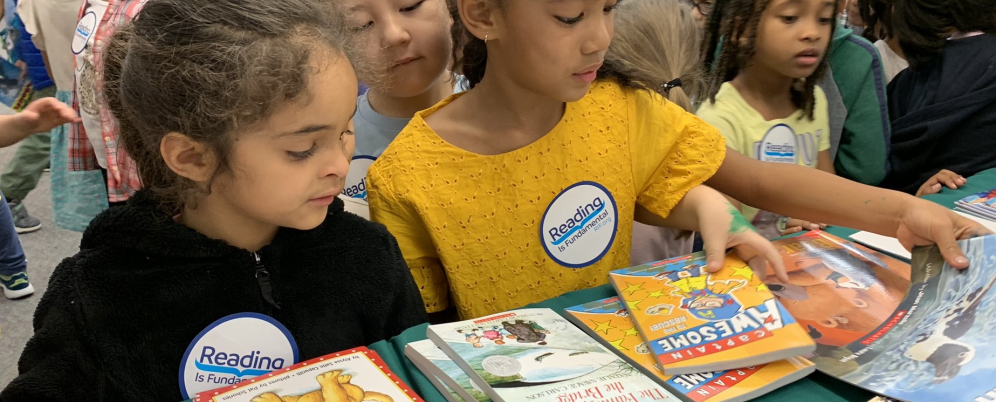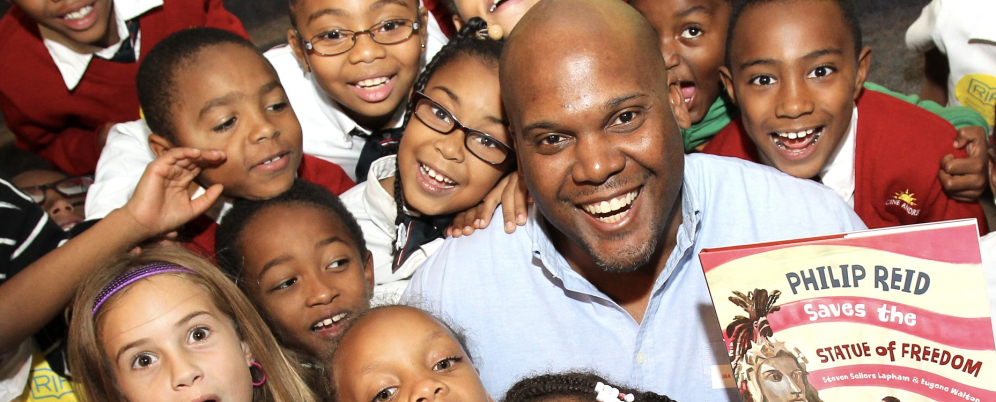Supporting Reading Skill Development in Social Studies
(As seen on edmentum)
For National Reading Month this March, we connected with a number of educators and literacy experts to ask for their insights on schoolwide strategies, classroom instruction, and ideas to make reading fun. In this piece, we’re sharing a Q&A with Kip Plaisted, a public school teacher with 20+ years of experience. He currently serves as an English and Social Studies Content Leader at Stuart-Hobson Middle School, in the District of Columbia Public Schools (DCPS). Kip is also his school’s Debate Faculty Sponsor; in his three years as coach, three teams have participated in the National Championships and one earned a first place win.
Kip puts his passion for literacy education to further use as a member of Reading Is Fundamental's Middle School Literacy Advisory Board. His recent initiatives have included collaboration on the design of professional development opportunities focused on effective literacy practices for middle school educators, evaluation and recommendation of literacy resources, and development of a rigorous and engaging middle school literacy curriculum aligned with DCPS standards.
We discussed ways to support literacy development in the social studies subject area, the importance of higher-level thinking skills, and how school leadership can collaborate with teachers to form a strong literacy culture. Read the Q&A below:
How does it hold kids back in their other subjects, such as social studies, when they are behind in their reading skills?
Kip Plaisted: Reading is the foundation for learning across all subjects. When students struggle with reading, it creates a domino effect that impacts their performance in social studies, science, and beyond. Across any discipline, it is vital to teach students how to speak, write, and communicate within the content matter.
In social studies, students encounter complex texts, primary sources, and historical documents. If they can't understand vocabulary and make inferences, they'll struggle to grasp key concepts, analyze events, and engage in critical thinking about historical and societal issues as historians. This can lead to lower grades, decreased motivation, and a sense of frustration.
Imagine a student trying to understand the American Revolution through primary source documents. If they struggle to decode the language or comprehend unfamiliar vocabulary like "tyranny" or "representation," they'll miss the core ideas driving the conflict. This impacts their ability to analyze the events, understand the perspectives of different historical figures, and draw meaningful conclusions.
Once kids reach the middle school level, what are some specific ways educators can ensure they not only continue to build their reading skills, but embrace the opportunity to be a reader?
KP: Middle school is a critical time for fostering a love of reading. Here are some strategies:
- Choice and Agency: Offer diverse texts that reflect students' interests and cultures. Allow choice in reading selections and independent reading time.
- Relevance and Connection: Connect reading to real-world issues, current events, and student passions. Show how reading applies to their lives.
- Community and Collaboration: Create book clubs, literature circles, and opportunities for peer-to-peer discussions about books.
- Modeling: Teachers should share their own reading experiences and enthusiasm for books with book talks and “think out louds.”
- Beyond the Classroom: Encourage reading outside of school through library visits, family reading time, and participation in reading challenges.
For example, a social studies teacher could incorporate historical fiction novels alongside non-fiction texts, allowing students to connect with the past on a personal level.
Middle school is a critical time for fostering a love of reading
How can social studies teachers support literacy skills?
KP: Social studies offers a rich context for literacy development. Here's how:
- Diverse Texts: Use primary sources (letters, diaries, speeches), news articles, historical fiction, biographies, and multimedia resources.
- Explicit Instruction: Teach reading strategies like summarizing, annotating, and identifying main ideas and supporting details within social studies texts.
- Vocabulary Development: Focus on building social studies-specific vocabulary (e.g., democracy, republic, citizenship).
- Writing Across Disciplines: Integrate writing activities like essays, research papers, and debates that require students to analyze and synthesize information from social studies texts.
- Collaboration: Partner with English Language Arts teachers to align curriculum and reinforce literacy skills across both subjects.
Why do students need to develop their higher-level thinking skills? How does this help students apply literacy skills in different contexts, such as debate?
KP: Higher-level thinking skills, like analysis, evaluation, and synthesis, are essential for students to go beyond simply understanding information and move towards applying their knowledge in complex situations. In debate, for example, students must:
- Analyze arguments: Identify claims, evidence, and reasoning.
- Evaluate evidence: Determine the credibility and relevance of sources.
- Synthesize information: Connect ideas from multiple sources to form their arguments.
- Construct persuasive arguments: Develop logical reasoning and support their claims with evidence.
- Communicate effectively: Express their ideas clearly and persuasively.
These skills are not only crucial for debate, but for success in college, careers, and civic life.
How can teacher leaders and school administrators work together to build a strong culture around literacy?
KP: Building a strong literacy culture requires a collaborative effort:
- Shared Vision: Develop a shared vision for literacy that is communicated clearly to all stakeholders.
- Resources and Support: Provide teachers with access to high-quality literacy resources, professional development, and ongoing support.
- Time for Collaboration: Create dedicated time for teachers to collaborate on literacy instruction, share best practices, and analyze student data.
- Modeling and Leadership: School leaders should model their own commitment to literacy and actively participate in literacy initiatives.
- Family and Community Engagement: Involve families and the community in literacy events and initiatives.
Develop a shared vision for literacy that is communicated clearly to all stakeholders

